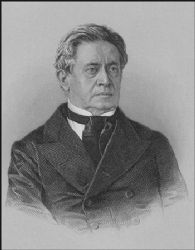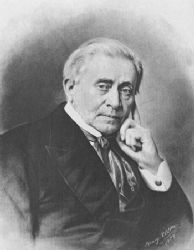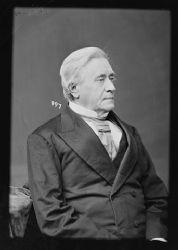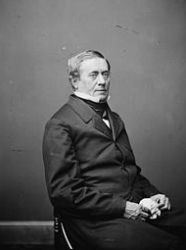Physicist who was an early investigator of electromagnetism, he became secretary of the Smithsonian Institution in 1846. In that role, although opposing the Civil War privately, he became a reluctant advisor to President Abraham Lincoln on scientific affairs.
Henry “was an eminent physicist before he was called to his present position. His original investigations, especially in light and electricity, were of great value, and but for his inborn modesty would have credited him with the invention of the art of telegraphy,” remembered Treasury official Lucius Chittenden. “After he was placed in charge of Smithson’s great trust, he devoted himself to its care and development, and to the advancement of the interests of the republic whose servant he had become. With what fidelity he preserved the principal of that trust, and with its interest built up an institution for scientific work on a scale of magnitude of which Smithson never dreamed.”1 Henry’s invention of the electromagnetic relay helped make the telegraph practical, wrote Lincoln scholar Tom Wheeler.2
In private, Henry opposed abolition, secession, and he Civil War. He was highly skeptical of politics and most civic organizations and highly protective of the nonpartisan nature of the Smithsonian. “Although Henry opposed coercive reunion as futile, he conducted scientific research on behalf of the Union war effort once hostilities began,” wrote historian Michael F. Conlin. “He viewed the Civil War as yet another obstacle to his mission to support American scientific research.”3 Historian Kathleen W. Dorman wrote: “Henry was circumspect in expressing political opinions in public and even in private and was very careful to keep the institution apolitical, as he had even before the war. On April 26, [1861] he wrote his brother-in-law, ‘I perhaps ought not to say anything in the present condition of affairs, considering the position I hold in regard to the country.’ It is clear from his private correspondence, however, that he abhorred war and that he favored a peaceful separation, rather than a bloodbath. He feared that in the end the country would be “as far from a harmonious union as we now are.’ Henry was personally opposed to slavery but, like many others of the time, favored colonization in Africa over abolition.”4 Conlin wrote: “In private he wondered whether there were ‘any proper grounds for a civil war?’ Believing that black people could live with white people only in a state of servitude, he predicted that civil war and the abolition of slavery would lead to further discord.”5 Henry biographer Albert E. Moyer wrote that Henry “backed Lincoln’s action to free the slaves, although he still doubted that ex-slaves could cope and compete in the broader, white society; indeed, in 1869, still advocating the relocation of African American slaves to Liberia.”6
Henry’s scientific views were valued by President Lincoln, who like Henry, attended New York Avenue Presbyterian Church. But even Henry’s help for the president got him into trouble with those who doubted Henry’s loyalty. Journalist William A. Croffut recalled that an army officer came to Lincoln’s office one day early in the war and proclaimed: “Mr. President, I bring to you this morning the proofs of what I told you a month ago — that Professor Henry is a rebel. He is right in with them. Last night at midnight he flashed red lights from the top of his building, signalling to the Secesh who flock on the hills back of us. I saw them myself.” The President then turned to Henry, who was seated in a corner of his office and demanded: “Now you’re caught! What have you to say, Professor Henry, why sentence of death should not immediately be pronounced upon you?” The President then proceeded to explain that he had been present at the Smithsonian with Henry the night before when new army signals were tested.7
Henry was particularly concerned to protect the reputation, finances, and independence of the Smithsonian, which housed the city’s largest auditorium. Historian Michael F. Conlin wrote that in the 1850s, Henry began a lecture series as an outreach effort: “Henry regarded the Smithsonian lectures as ‘the least important feature’ of the Institution’s research program because they only diffused existing knowledge…and did so only to a local audience.”8 The lectures, however, developed an important local following. In late 1861, they were effectively hijacked by abolitionists to deliver a series of lectures against slavery under the auspices of the Washington Lecture Association. The pressure on Henry to accept the lecture series was heightened by the addition of new Republican members of the Smithsonian board, but still he resisted. WLA supporters took their case to Illinois Congressman Owen Lovejoy, an old Lincoln friend, who went to the to press his case against Henry. Henry opposed and then tried to mitigate the impact of the 22 lectures which concluded in April 1862. Professor Henry insisted on a disclaimer of responsibility for the content of the lectures, which the WLA president interpreted as: “I am requested by Professor Henry to announce that the Smithsonian Institution is not in any way responsible for this course of lectures. I do so with pleasure and desire to add that the Washington Lecture Association is in no way responsible for the Smithsonian Institution.”9 Laughter ensued.
According to Lincoln biographer Charles Carleton Coffin, Lincoln met Henry while walking: “I am delighted to make your acquaintance, Mr. Henry. I long have heard of you. Come to the White House. I want to know about the Smithsonian Institute, with which you are connected, and what is going on in the world of science.” Coffin wrote: “The acquaintance ripened into one of affectionate intimacy. Professor Henry spent many evenings in the family apartments at the White House. It was a great relief to the President, after the perplexities of the day, to converse with one of the foremost scientists of the age.”10
Lincoln had a strong interest in proposed military weapons but recognized that many of them were humbug. In 1861, for example, Henry was called upon to provide a comprehensive analysis of the military utility of hot-air balloons. “Inventors overwhelmed the government with suggestions for various kinds of military technology at a time when there was no mechanism for screening and evaluating the proposals. Henry, to whom the military referred many of these, suggested the establishment of what became known as the Permanent Commission of the Navy Department,” wrote Marc Rothenberg, editor of Joseph Henry’s papers. “Henry served on the three-member commission from its inception in early 1863, and the group met as often as three times a week, often in the Castle, to evaluate a steady stream of proposals for warship designs, underwater guns, torpedoes, and the like.”11
In March 1863, Professor Henry was recruited to explain world geography to a group of Native American chieftains visiting at the White House. After President Lincoln spoke, Henry provided “a detailed and interesting explanation of the formation of the earth, showing how much of it was water and how much of it was land.”12 Henry was also called by President Lincoln to investigate the legitimacy of a celebrated medium, Lord Colchester. Doris Kearns Goodwin wrote that after Henry’s investigation turned up no evidence, he “happened to be seated on a train beside a young man who revealed that he manufactured telegraphic devices for spirtualists. Placed around the biceps, the instrument produced telegraphic clicks when the medium stretched his muscle. Asked if he had sold one to Lord Colchester, the young man said yes. Lincoln was reported ‘pleased to learn the secret.'”13 Lucius Chittenden, a Treasury Department official whose recollections of the Lincoln Administration have sometimes been questioned, recalled a meeting with Henry and President Lincoln:
Do you often see the President?” asked Dr. Henry, when his business was completed.
“Occasionally,” I answered. “He sometimes visits this office, as I presume he does many others. He is always welcome here, but his visits are by no means as frequent as I would make them if I could.”
“I have only recently come to know the President, except from a passing introduction,” he said. “I have lately met him five or six times. He is producing a powerful impression upon me, more powerful than any one I can now recall. It increases with every interview. I think it my duty to take philosophic views of men and things, but the President upsets me. If I did not resist the inclination, I might even fall in love with him.”
It was my opportunity to lure him on. Any views of his about President Lincoln could not fail to be of interest. “Yes?” I said. “Possibly you do not differ from the rest of us. I know of nobody in this department who knows the President who fails to respect and admire him. What do you find in him so attractive?”
“I have not yet arranged my thoughts about him in a form to warrant their expression,” he replied. “But I can say so much as this: President Lincoln impresses me as a man whoso honesty of purpose is transparent, who has no mental reservations, who may be said to wear his heart upon his sleeve. He has been called coarse. In my interviews with him he converses with apparent freedom, and without a trace of coarseness. He has been called ignorant. He has shown a comprehensive grasp of every subject on which he has conversed with me. His views of the present situation are somewhat novel, but seem to me unanswerable. He has read many books and remembers their contents better than I do. He is associated with men who I know are great. He impresses me as their equal, if not their superior. I desired to induce him to understand, and look favorably upon, a change which I wish to make in the policy of the Light-House Board in a matter requiring some scientific knowledge. He professed his ignorance, or, rather, he ridiculed his knowledge of it, and yet he discussed it as intelligently—”
“The President!” here interrupted a messenger, opening the door to admit President Lincoln.
“You have interrupted an interesting commentary,” I began, laughingly, as I rose to welcome him.
“Do not! You “will not say another word I” exclaimed the doctor, blushing like a school-girl. “You will mortify me excessively if you do.” I saw that he took the matter seriously, and hastened to change the conversation.
These two great Americans seated themselves side by side. They had a long conversation. I took no part in the conversation, and shall not attempt to recall it. It began with the subject of the destruction by the Confederates of all the lights, buoys, and signal stations along their coast; their purpose in such acts, and how our own vessels could best dispense with these aids to navigation. It diverged to the subject of illuminating oils of different kinds. I inferred that the professor was experimenting with lard oils, with a view to their introduction on account of the saving of expense in their use. I could not discover that the President was at a loss for a moment, and that he conversed in any particular less intelligently than the professor. The latter looked at his watch, apologized for keeping Mr. Lincoln so long, and with the air of having done something very reprehensible, abruptly took his leave.
“Do you often see Professor Henry?” inquired the President, as soon as the door had closed.
I smiled, for it was the identical question which the professor had asked me about the President.
“My visits to the Smithsonian, to Dr. Henry, and his able lieutenant, Professor Baird, are the chief recreations of my life,” I said. “These men are missionaries to excite scientific research and promote scientific knowledge. The country has no more faithful servants, though it may have to wait another century to appreciate the value of their labors.”
“I had an impression,” said Mr. Lincoln, “that the Smithsonian was printing a great amount of useless information. Professor Henry has convinced me of my error. It must be a grand school if it produces such thinkers as he is. He is one of the pleasantest men I have ever met; so unassuming, simple, and sincere. I wish we had a few thousand more such men!”
It was not strange that these two great men were attracted towards each other. In their natural qualities of sterling honesty, simplicity, and unselfishness, they were much alike. It was in their acquisitions that they differed, and these did not constitute the foundations of their characters.14
In January 1865, near the end of the war, a fire consumed the second floor of the Smithsonian, destroying Henry’s office and the lecture hall located there. A decade after the Civil War, Henry met Alexander Graham Bell and encouraged him in the development of the telephone.
Footnotes
- Lucius E. Chittenden, Recollections of President Lincoln and his Administration, p. 235
- Tom Wheeler, Mr. Lincoln’s T-Mails, p. 18.
- Michael F. Conlin, “The Smithsonian Abolition Lecture Controversy: The Clash of Antislavery Politics with American Science in Wartime Washington,” Civil War History, December 2000, p. 306.
- Kathleen W. Dorman “‘Interruptions and Embarrassments’:The Smithsonian Institution during the Civil War,” http://siarchives.si.edu/history/jhp/civilwar.htm
- Michael F. Conlin, “The Smithsonian Abolition Lecture Controversy: The Clash of Antislavery Politics with American Science in Wartime Washington,” Civil War History, December 2000, p. 307.
- Albert E. Moyer, Joseph Henry: The Rise of an American Scientist, p. 69.
- William A. Croffut, American Procession, 1855-1914, p. 59.
- Conlin, “The Smithsonian Abolition Lecture Controversy: The Clash of Antislavery Politics with American Science in Wartime Washington,” Civil War History, December 2000, p. 303.
- Croffut, American Procession. 1855 to 1914, p. 61.
- Charles Carleton Coffin, Abraham Lincoln, p. 278.
- Marc Rothenberg, “Joseph Henry: Science Adviser,” http://siarchives.si.edu/history/jhp/joseph05.htm
- CWAL, Volume VI, p. 151.
- Doris Kearns Goodwin, Team of Rivals, p. 509.
- Chittenden, Recollections of President Lincoln and His Administration, pp. 236-238
Visit











